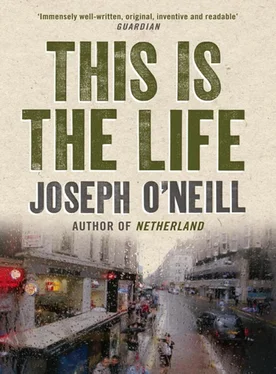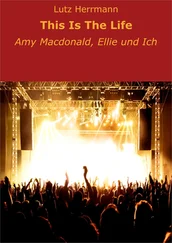‘Well, Michael,’ I said, ‘how are things?’
Everyone looked at me. Everyone stopped what they were doing.
Donovan said, ‘Very well, er —. How are you?’ He gave me a blank, though not unfriendly, look. Then he smiled politely. ‘How’s the, er, work getting on?’
It was obvious to me, and to everyone else, that he did not have a clue who I was, or what I did — in fact, he looked at me as though he had never met me in his life! Now, although I never forget a name myself, I can well understand that a person like Donovan, a big fish, has better things to do than remember all the small fry he has ever met, the plankton of casual acquaintances. He has other things on his mind, he has global problems to crack, issues that affect all of humankind. But forgetting me — this was truly extraordinary. I was small fry, yes, I would be the last to deny it — but I was also his former pupil! Only three years previously I had spent six months tête-à-tête with him, locked in collaboration, my side by his side. It was a time of extreme proximity and affiliation. For six months I carried his papers and tidied his room, for six months I researched his opinions, made his coffee, drafted his pleadings and operated his telephone. For half a year I was an indispensable, if extricable, part of his practice — if not his right hand, or even his fingers and ears, then his shoe-laces, his cuff-links. He had counted on me, and in my humble way, I had counted for something.
Since that time my appearance had stayed roughly the same. Admittedly, my hair had thinned somewhat and my face had accrued more flesh — but it was not as if I had grown a moustache or dramatically changed my accent. I had, moreover, dropped him a note from time to time to keep him up to date on my progress. (How stupid of me! I cringed at the memory of those letters, their earnestly informative, self-important tone …) How, in all these circumstances, could it be that I, or something about me — my voice, my manner, the way I looked — rang no bells?
‘Fine,’ I said, ‘fine.’
There followed an unhappy, a miserable, hesitation. We both looked about the room, brimming with chortling lawyers, to avoid one another’s eyes. The other members of the group exchanged glances. I felt ridiculous. Although, as a rule, I am more than content with who and what I am, the incident was nevertheless an unhappy reminder of my unimportance in the legal world. The moral was clear: Donovan was out of my league now. I had no business talking to him. I swallowed wretchedly at my glass. It was empty. When I looked up I sensed that everyone was waiting for me to say something, and I noticed Donovan’s eyes were flickering around the room, searching for a getaway. I decided to act, it was time to put an end to this torture.
‘Well, it’s nice seeing you again,’ I said, and clumsily wandered off at the wrong moment, just as Donovan opened his mouth to reply. I turned round to repair my error but it was too late. Along with the others he had turned his back and doubtless had already purged the incident from his mind.
What Donovan had forgotten was that my name is Jones, James Jones. It is a plain, transparent name and, until an unrelated namesake induced a mass-suicide in Guyana, was an unremarkable one. I am a junior partner in Batstone Buckley Williams, an unprestigious firm of solicitors in the West End of London. I have a general, unspecialized practice: quite a lot of personal injury, family, some landlord and tenant, conveyancing, the odd bit of crime. I think it is true to say that, by commonly accepted standards, I am not an especially successful lawyer. I do not regret this, as professional success is not something I set great store by. Of course, it would be nice to wake up in the morning a highly paid and famous lawyer, respected and admired by my fellow men — given that option, I would take it like that, in the click of two fingers. But the pain of actually achieving that type of standing, the sacrifices, the boredom — these are not for me.
By contrast, for those of you who have not heard of him, Professor Michael Donovan QC was, in the autumn of 1988, one of the most triumphant practitioners at the English Bar. He was easily (there is no doubt about this) the top international lawyer in these islands, the possessor of a world-class legal mind. That mind of his … It was naturally and freakishly powerful, like a once-in-a-blue-moon tidal wave, or a tree-plucking wind in England. Perhaps this is a pedestrian or fanciful metaphor, but I most easily visualize it as one of those fat Swiss army penknives, deceptively stocked with cutthroats and instruments of severance, disassembly and dissection: razors, scissors, corkscrews, bottle-openers, screwdrivers, magnifying lenses, the lot. In a flash, before you could mobilize a brain cell, he would have dismantled an issue, anatomized its components and analysed its implications. He had all the intellectual tools, and this showed, this shone, in his writings. He was a great academic — innovative, controversial, scholarly — a star. He wrote his books and articles in a simple, transparent style, using short, pithy sentences, which meant that apart from anything else, he was immensely readable. He was the M. J. P. J. Smith Professor of International Law at Cambridge University, and his publications excited interest and envy around the world.
Donovan, then, was equipped for any contingency of legal warfare. For myself, I can safely say that he was the most brilliant court lawyer I have ever seen, and probably the most feared as well. His advocacy, whether in court or at the negotiation table, was — I was about to say brutal, but that word has connotations of crudeness that would not be quite right — inexorable. I for one have never seen anything like it. The only feasible comparison I can think of is with the American heavyweight boxer Mike Tyson. If you have seen this man boxing in his prime you will know what I am talking about. He is not especially tall, so it is hard to pick him out in the crush when he pushes through the bodyguards, photographers and spectators that crowd him on his way to the ring. But when he finally stands disrobed and gleaming in the floodlight, he is unmistakable: black, baggy silk shorts, long bludgeoning arms and eager, focused eyes. Then the bout: some combinations to the torso, an uppercut, then bam — a sickening bullseye to the jaw, and Tyson’s opponent is on his back, seeing stars.
I am not suggesting that Donovan’s entrée to the courtroom was the same as Tyson’s to his forum, or that he disposed of cases in a matter of minutes; but Donovan, like Tyson, had a capability unhesitatingly to unleash inimitable, efficient destruction. He would immediately detect any flaw in an argument, spontaneously expose it, and then carefully cudgel it with spot-on, shuddering verbal blows. There was no holding back, but nor was there vindictiveness: personal feelings, emotions, did not enter into it.
I must return for a minute to what I have roughly called Donovan’s inexorableness. It marked everything he did. His actions had an unrelenting shape to them, the shape of things to come. He was streaming forward at such a speed, and so unerringly, that his future seemed a foregone conclusion.
In short, then, reading that item in the newspaper turned my thoughts to Donovan for the first time in a long time. Going up to my office that morning in the full-up elevator, I worried about his well-being. Collapse? What was it, heart? Stroke? At his age? In his mid-forties?
When I had ascended to the fourth floor I stepped quickly into my office, preoccupied by the business. I helped myself to a black coffee and sat in the chair behind my desk. It was half-past eight, I had about half an hour to myself before everyone would come in. So Donovan had collapsed on his feet, I thought to myself. What did that mean, collapsed? I tried to imagine it: had he fallen over the lectern clutching his chest, powerlessly splashing papers everywhere? Or had he buckled at the knees and slumped to the floor, folding up like an old deckchair? What had happened?
Читать дальше
Конец ознакомительного отрывка
Купить книгу












